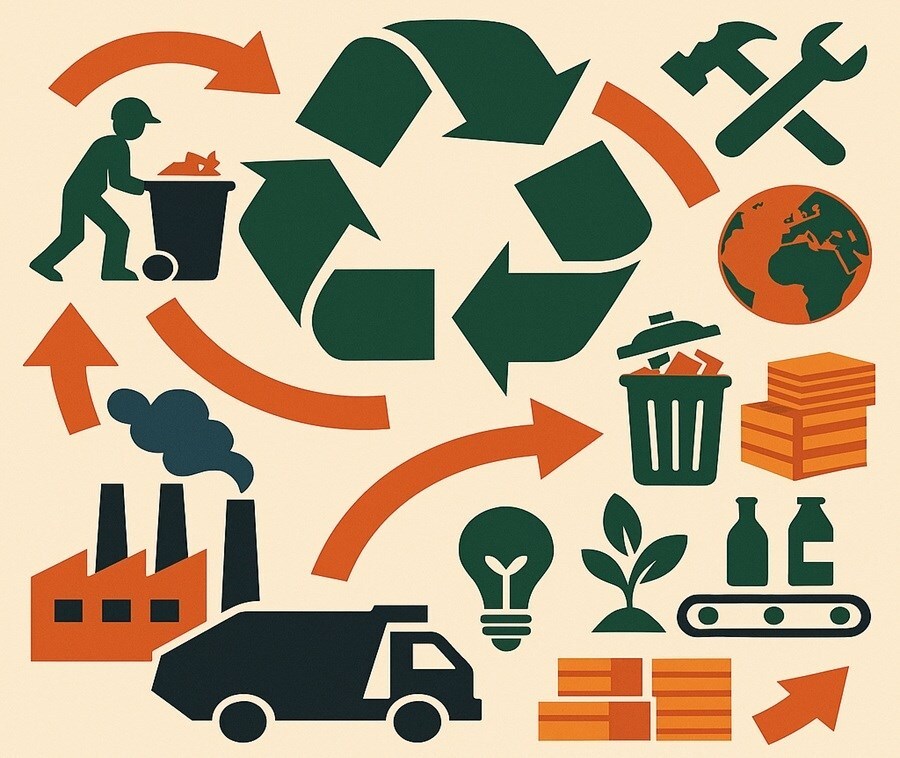您想继续阅读英文文章还
是切换到中文?
是切换到中文?

THINK ALUMINIUM THINK AL CIRCLE

The Chartered Institution of Wastes Management (CIWM) has published a new report, “Let’s Not Waste the Next Four Years,” setting out key actions to speed up the UK’s transition to a circular economy.

Released in September 2025, the report comes at a time when the government is advancing overlapping reviews linked to net zero, skills, and industrial strategy.
Waste sector’s economic weight
Every year, the UK’s resources and waste industry handles more than 70 million tonnes of material and provides jobs for 145,000 people. CIWM argues the sector is more than just waste collection — it underpins economic growth, strengthens supply chains, and plays a vital role in hitting climate targets.
Its long-standing mission, built on education, training, and policy influence, has made it a cornerstone of the green economy.
Policies in motion — but gaps remain
Several big policy packages are already in play. A new Circular Economy Strategy for England is expected later this year, while work is advancing on the Net Zero Strategy, the Modern Industrial Strategy, and a Critical Minerals Strategy. Skills England is drawing up workforce plans, and Defra has been reviewing regulations, including consultations on Landfill Tax reform, energy-from-waste inclusion in the UK Emissions Trading Scheme, and new rules for residual waste.
But CIWM cautions that progress is uneven. Too many roadmaps are being developed in isolation, risking overlap or contradiction. Green skills have not received the focus they need, reforms from the 2018 Resources and Waste Strategy remain stalled, and weak enforcement continues to leave space for waste crime.
Also read: Scotland’s circular economy adds £7B to GVA but methodology constraints cloud comparisons
Spotlight on aluminium recycling
The report devotes attention to aluminium — a material that can be recycled endlessly with no loss of quality and at a fraction of the energy cost of primary production. CIWM has thrown its weight behind Extended Producer Responsibility schemes, better digital waste tracking, and regulatory tightening to support recycling.
It also works with Alupro and other industry partners to improve data accuracy and raise collection rates, while pushing for investment in new sorting technologies and professional training for recycling workers.
Global and political pressures
The call for action comes against a difficult backdrop. Geopolitical tension between the US and China, the war in Ukraine, and wider global instability have all underscored the importance of securing UK resources. At home, political shifts following recent elections risk pulling focus away from the green agenda. CIWM argues these pressures make resilience more urgent than ever.
Ten recommendations for action
To close the gaps, CIWM sets out ten priorities. Top of the list is embedding circular economy principles across all government policy areas. It also calls for stronger coordination between the various taskforces and advisory bodies, more investment in green skills, faster roll-out of digital waste tracking, tougher measures on waste crime, and full producer responsibility for packaging and residual waste.
Looking ahead
The recommendations are linked to national targets: halving avoidable waste by 2025, eliminating landfill by 2050, and lifting recycling rates above 70 percent. CIWM insists these ambitions are realistic if government and industry move in step.
At the report’s launch, the institution pledged to keep working with ministers, businesses, and local authorities to make sure the next four years deliver visible progress. Without that, it warns, the UK risks losing momentum on both environmental goals and economic opportunities.
To know more about recycled aluminium, please refer our report: World Recycled ALuminium Market Analysis Industry forecast to 2032
Responses








